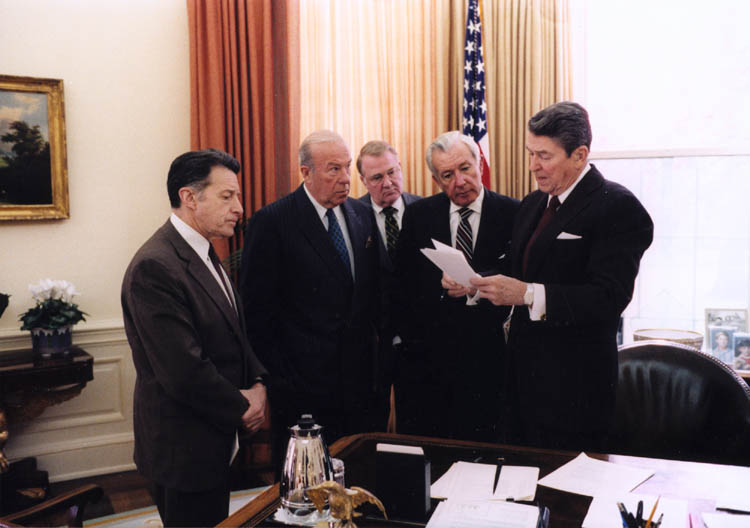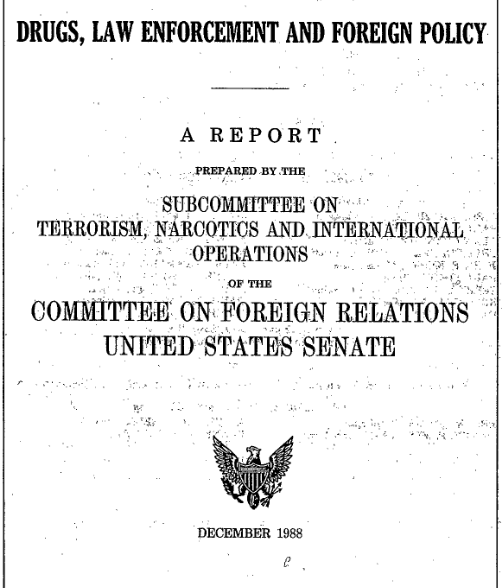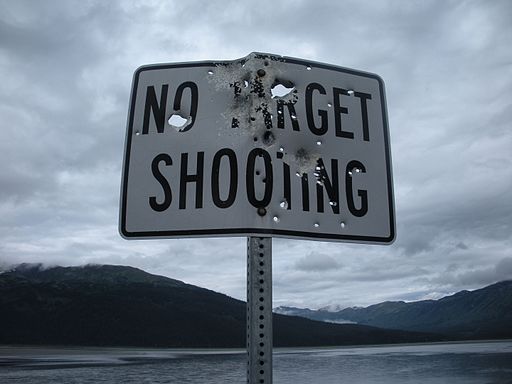Investigative journalist Robert Parry, founder and editor of the website
Consortium News, died on January 27 after a series of strokes precipitated by pancreatic cancer. He was 68.
Adding “investigative” to Mr. Parry’s job description of journalist gives an insight into the principles he applied to his work. Aren’t all journalists investigators in some way or other? No. Some are content rewriting press releases. Robert Parry was not one of those, and for that he paid a price in getting pushed out of working for mainstream media outlets. He would never be one of those television talking heads claiming journalist credentials while making millions of dollars for asking trivial questions of celebrities about their plastic surgeries. He came by his credentials through hard work looking into things that matter.
 President Ronald Reagan in the Oval Office on November 25, 1986, with Secretary of Defense Caspar Weinberger, Secretary of State George Shultz, Attorney General Ed Meese, and Chief of Staff Don Regan, discussing remarks he intended to make at a press briefing on the Iran-Contra affair.
President Ronald Reagan in the Oval Office on November 25, 1986, with Secretary of Defense Caspar Weinberger, Secretary of State George Shultz, Attorney General Ed Meese, and Chief of Staff Don Regan, discussing remarks he intended to make at a press briefing on the Iran-Contra affair.Robert Parry was best known for breaking the story in the second term of President Ronald Reagan in the 1980s that eventually became known as the
Iran-Contra affair. The Contras were Nicaraguan rebels or terrorists, depending on point of view, who sought to overthrow the Sandinista government of Nicaragua. Earlier in the decade, the United States Congress had passed legislation making it more difficult for the Reagan administration to meddle in Nicaraguan politics by supporting the Contras. The administration circumvented the law by selling arms to Iran, a purported enemy, and funneling the profits to the Contras.
Mr. Parry also wrote about how the CIA appeared to be
enabling drug trafficking by the Contras in order to give them more material support, though it was another investigative journalist,
Gary Webb of the
San Jose Mercury News who explored the story in greater detail in 1996. In the early 1990s, Mr. Parry wrote about another aspect of the Reagan years that remained in shadows, which was the possibility of a deal between Reagan’s campaign team and the Iranian government to delay releasing the 52 American hostages Iran had held from November 4, 1979, until after the U.S. presidential election in 1980. Iran released the hostages on January 20, 1981, when Reagan was sworn in as president. Jimmy Carter lost his bid for re-election in large part due to the poor economy, and at least in small part due to the continuation of the hostage crisis.
Because of Mr. Parry’s habit of pursuing stories like that, he wore out his welcome with the corporate media outlets he had been working for, such as
Newsweek and the
Associated Press, and in 1995 he started
Consortium News, possibly the first
independent online news site written and edited by a reputable, professionally trained journalist. Since then online news sites have proliferated, which has been both good and bad for readers. It has been good for the obvious reason that more choice means a discerning reader is likely to find a trustworthy site delivering quality journalism, and bad because more choice means the non-discerning reader is likely to find a site masquerading as news that serves up opinions which reinforce existing prejudices. Add to that the algorithm of a social media platform like Facebook which ensures readers see more of what they want to see, and it’s an uphill battle for the truth.
 Cover of the Kerry Committee December 1988 final report of an investigation by the Senate Foreign Relations Committee’s Subcommittee on Terrorism, Narcotics, and International Operations into the possible role of the Nicaraguan Contras in drug trafficking.
Cover of the Kerry Committee December 1988 final report of an investigation by the Senate Foreign Relations Committee’s Subcommittee on Terrorism, Narcotics, and International Operations into the possible role of the Nicaraguan Contras in drug trafficking.Robert Parry surely understood the maxim that we are all entitled to our own opinions, but not to our own facts. He also understood that some facts, known collectively as the truth, were unpleasant for all kinds of reasons, chief among them that they afflicted the comfortable, another maxim. And to underscore how old school was his journalistic integrity, never mind his early appearance on the digital frontier, Mr. Parry knew his first job was to tell the truth, and if that meant he wasn’t invited on the Washington, D.C. cocktail club circuit, then so be it. People like him don’t end up making millions of dollars, and don’t realistically expect to, but to the readers who valued his services he was one in a million.
— Ed.






